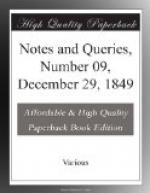* * * * *
Sir E. Dering’s household book.
The muniment chests of our old established families are seldom without their quota of “household books.” Goodly collections of these often turn up, with records of the expenditure and the “doings” of the household, through a period of two or more centuries. These documents are of incalculable value in giving us a complete insight into the domestic habits of our ancestors. Many a note is there, well calculated to illustrate the pages of the dramatist or the biographer, and even the accuracy of the historian’s statements may often be tested by some of the details which find their way into these accounts; as for the more peculiar province of the antiquary, there is always a rich store of materials. Every change of costume is there; the introduction of new commodities, new luxuries, and new fashions, the varying prices of the passing age. Dress in all its minute details, modes of travelling, entertainments, public and private amusements, all, with their cost, are there: and last, though not least, touches of individual character ever and anon present themselves with the force of undisguised and undeniable truth. Follow the man through his pecuniary transactions with his wife and children, his household, his tenantry, nay, with himself, and you have more of his real character than the biographer is usually able to furnish. In this view, a man’s “household book” becomes an impartial autobiography.
I would venture to suggest that a corner of your paper might sometimes be profitably reserved for “notes” from these household books; there can be little doubt that your numerous readers would soon furnish you with abundant contributions of most interesting matter.
While suggesting the idea, there happens to lie open before me the account-book of the first Sir Edward Dering, commencing with the day on which he came of age, when, though his father was still living, he felt himself an independent man.
One of his first steps, however, was to qualify this independence by marriage. If family tradition be correct, he was as heedless and impetuous in this the first important step of his life, as he seems to have been in his public career. The lady was Elizabeth, daughter of Sir Nicholas Tufton, afterwards created Earl of Thanet.
In almost the first page of his account-book he enters all the charges of this marriage, the different dresses he provided, his wedding presents, &c. As to his bride, the first pleasing intelligence which greeted the young knight, after passing his pledge to take her for “richer for poorer,” was, that the latter alternative was his. Sir Nicholas had jockied the youth out of the promised “trousseau,” and handed over his daughter to Sir Edward, with nothing but a few shillings in her purse. She came unfurnished with even decent apparel, and her new lord had to supply her forthwith with necessary clothing. In a subsequent page, when he comes to detail the purchases which he was, in consequence, obliged to make for his bride, he gives full vent to his feelings on this niggardly conduct of the father, and, in recording the costs of his own outfit, his very first words have a smack of bitterness in them, which is somewhat ludicrous—




